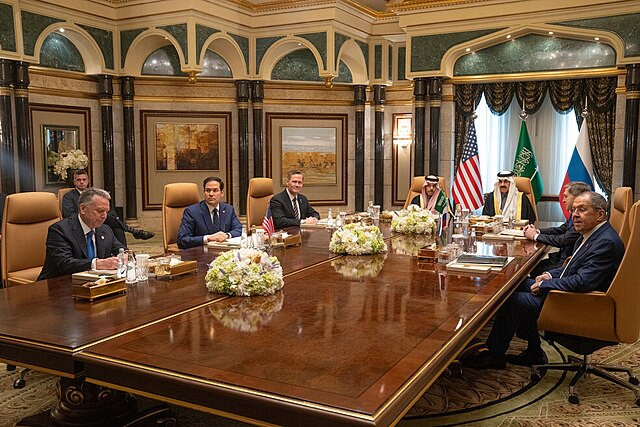The United States and Russia have agreed to initiate direct negotiations aimed at ending the war in Ukraine, marking a dramatic shift in U.S. foreign policy under President Donald Trump. The decision, announced Tuesday following high-level talks in Saudi Arabia, signals a potential thaw in relations between Washington and Moscow but has raised alarm among European allies and Ukrainian officials, who were excluded from the meeting.
U.S. Secretary of State Marco Rubio and Russian Foreign Minister Sergey Lavrov led the discussions, which also included senior officials from both governments. Rubio stated that the two sides agreed to pursue three main objectives: restoring diplomatic staffing at embassies in Washington and Moscow, forming a high-level team to support Ukraine peace talks, and exploring avenues for economic cooperation. Ending the war in Ukraine could “unlock the door" for "incredible opportunities that exist to partner with the Russians geopolitically and economically," Rubio said.
Lavrov characterized the meeting as constructive and noted that both sides had agreed to hold "regular consultations" on Ukraine. "We not only listened, but also heard each other," he told reporters. The talks, hosted at the Diriyah Palace in Riyadh, Saudi Arabia, were part of an effort to lay the groundwork for a future summit between Trump and Russian President Vladimir Putin.
Ukrainian officials were not invited to participate, a decision that has fueled concerns in Kyiv and across Europe. Ukrainian President Volodymyr Zelenskyy swiftly rejected any outcome from negotiations that did not include Ukraine's input. Zelenskyy vowed Kyiv would not accept any agreements made without Ukraine, adding that he had postponed a scheduled trip to Saudi Arabia in response to the talks.
European leaders have expressed similar unease. French President Emmanuel Macron convened an emergency meeting of European Union and British officials on Monday to assess the implications of the U.S.-Russia talks. Macron later said he had spoken with both Trump and Zelenskyy, stating that "Russia must end its aggression, and this must be accompanied by strong and credible security guarantees for the Ukrainians." British Prime Minister Keir Starmer is scheduled to meet with Trump next week, underscoring Europe's push to remain engaged in any diplomatic efforts.
While the meeting was framed as an early step toward peace, concerns remain over potential concessions. U.S. national security adviser Mike Waltz acknowledged that territorial negotiations would be part of the process, saying, "There's going to be some discussion of territory, and there's going to be a discussion of security guarantees." U.S. Defense Secretary Pete Hegseth previously indicated that NATO membership for Ukraine was unrealistic, suggesting Kyiv should reconsider its expectations regarding territorial recovery.
Saudi Arabia's role in brokering the talks underscores Crown Prince Mohammed bin Salman's ambitions to position the kingdom as a global diplomatic player. Saudi state media framed the negotiations as a success, though Zelenskyy's decision to postpone his visit suggests Ukrainian discomfort with Riyadh's involvement.
Meanwhile, the war in Ukraine continues. Russia launched 176 drones into Ukraine overnight, according to Kyiv's military, with strikes hitting residential buildings in multiple regions. The continued fighting highlights the urgency of diplomatic efforts, but also the challenges of reaching an agreement that satisfies all parties involved.





